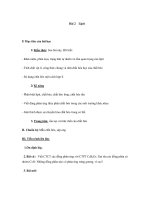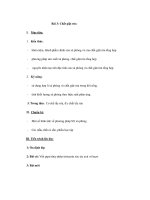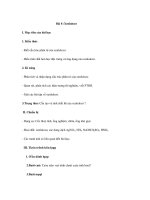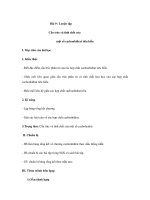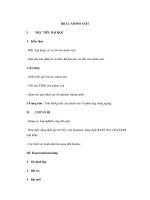On tap lop 12 chuong trinh nang cao hoc ky I nam hoc 2008-2009.doc
Bạn đang xem bản rút gọn của tài liệu. Xem và tải ngay bản đầy đủ của tài liệu tại đây (166.57 KB, 10 trang )
TIẾNG ANH 12 ( NÂNG CAO )
ANH VĂN 12 ( CHUẨN )
* * * * *
-A. CHƯƠNG TRÌNH ÔN TẬP ( TỪ TUẦN 1 ĐẾN HẾT TUẦN 15 )
I. TOPICS
-Các chủ điểm từ unit 1 đến unit 7 – chú trọng các chủ điểm sau:
* Home life
* Cultural Diversity
* School Education System
* Higher Education
* Future Jobs
* Economic Reforms
* Youth
II. LANGUAGE FOCUS
* Pronunciation
-Cách thức phát âm của một số nguyên âm, phụ âm thông dụng,
-Dấu nhấn âm một, hai và ba
* Vocabulary
-Từ vựng liên quan đến các chủ điểm trên
-Negative frefixes ( un-, im-, in-, dis-, ….)
-Compound adjectives ( adjective + noun )
* Grammar
1. Tenses of verbs : Simple present – Present progressive – Past simple – Past progressive – Present perfect
tense - Past perfect – simple future ,….
3. Reported speech
4. Relative clauses ( restrictive and non-restrictive)
5. Articles
6. Passive voice
7. Adverbial clauses and phrases of concession, places
8. Prepositions after verbs , Prepositions of time and place
9. Conditional sentences
* * * * *
-B. CẤU TRÚC ĐỀ KIỂM TRA HỌC KỲ
( Thời gian làm bài : 45 phút )
_Chọn từ đúng trong ngoặc : 3 điểm , 12 câu ( Ví dụ : Câu 1 : I’m interested ( in / on / at / for ) scientific
research. )
_Sử dụng dạng đúng để hoàn thành các câu cho sẳn : 2 điểm 4 câu.
_Đọc:
• Đọc một đoạn văn và trả lời các câu hỏi : 2 điểm , 4 câu.
• Dùng từ thích hợp điền vào chỗ trống trong đoạn văn : 1 điểm, 4 từ
_Viết lại câu : 2 điểm , 4 câu
VOCABULARY.
A. Choose the best answer:
1. My mother (takes / does / holds) the responsibility (of / for / in ) running the household.
2. Whenever problems comes ( up / out / from) , we discuss them (friendly / frankly / properly) and find
solutions quickly.
3. It is (wise / unwise / difficult ) for most Indian men to confide (Ø , for / in) their wives.
4. After (pray / being prayed / praying ) to ask for the ancestors' permission to be married, the groom and
bride (change / give / exchange ) their rings to each other.
5. My parents (allow / make / let ) me (to do / doing / do) a lot of homework every day.
6. Dad is always willing (to give / to join / to help ) a hand (in / with / on) cleaning the floor.
7. My responsibility is (wash / washes / to wash ) the dishes and take ( up / off./ out ) the garbage.
8. We are not (allowed / agreed / forced ) (talking / to talk / talk) on the phone late at night.
9. They are a very (closely- knit / close -knitting / close-knit) family and very supportive (of / to / for) one
another.
10. I (find /founded /found) it difficult to convince the ticket inspector that I (have lost / lost / had lost) my
ticket.
11. A (contractual / contract / contracting) marriage is a marriage which is (decided / held / approved ) by
the parents.
12. During the wedding ceremony, the (new wedded couples / newly wedding couples / newly wedded
couples) are given wedding cards and (money gifts / gift money / wedding money).
13. The (Americans / Indians / Chinese) are more concerned (in / with / for) physical attractiveness when
choosing a wife or husband.
14. A husband is (oblige / obliged / permitted) to tell his wife (where / why / what) he has been if he comes
home late.
15. A romantic marriage is a marriage in which love is (supposed / suppose / supposing) to (follow /
develop / precede ) marriage.
16. We are not (let / allowed / forced ) (go / to go / going)out with friends at night.
17. The conical form is (cover / covering / covered ) with young palm (leaf / leafs / leaves )
18. Both parents join (a hand / their hands / hands) to give us a nice house and a happy (home / house /
family)
19. Family is a base (at / from / in) which we go into the world (with / by / in ) confidence.
20. Most Indians think that a woman has (to do /to offer / to sacrifice ) (more than / less than / equal to)men
in marriage.
21. Most Indian men don't think that it is (wise / unwise / right ) to confide (for / out / in) their wives.
22. Mum is always the first (to get / getting / get ) up in the morning to make (sure / surely /certainly) her
children leave home for school with breakfast and suitable clothes.).
23. As soon as I (have / have had / had) a good look at the designs , I (send/ will send / would send) them
back
24. You should try to (observe / stick / obey) to your family's regulations to avoid the (problems / arguments
/ discussion) between the members of the family.
25. To get somebody 's (attraction / attendance / attention) , we can use either verbal or (none- verbal / no -
verbal / non- verbal) communication..
26. Pointing to a student in class is ( polite / rude / acceptable ) if the teacher wants to ask him a question.
27. Tom said that he (sent / has sent / had sent ) you countless letters .
28. Finally, thanks to their parents’ help, they found the (way/ decision/ solution) to that problem.
29. Ours will be an (inside / informal / uniform / uneasy) party, so just wear casual clothes if you can come.
30. One of the typical (actions / methods / advantages / features) of the Vietnamese cultures is worshiping
ancestors.
WORD FORMS.
• Use the correct form of the word in brackets to fit each gap.
1. She acted in passive ............ to her boss’s directions. (obedient)
2. For............ reason, passengers are requested not to leave any luggage unattended.(secure)
3. She was very ............ during my father’s illness. (support)
4. Going to university has made her more ............ . (confide)
5. We hope the difficulty can be ............ by getting the two sides together to discuss the issues.
(solution)
6. Can I rely on you to behave ............ while I’m away? (responsibility)
7. He admitted ............ to smuggle cannabis. (attempt)
8. I’d like to make a ........... for four people for Friday night please. . (reserve)
9. I got to he airport early to be ready for the first ............ out. (fly)
10. Some poor families are unable to meet their ............ needs.(base)
11. He is one of the 30........... f or the manager’s job. (apply)
12. We have been asked not to say anything for ............ reason. (secure)
13. He gives one lecture and two ............ a week. (tutor)
14. The ........... notice will be sent to you if your scores meet the requirements of admission. (accept)
15. There will be fewer ........... places left at the universities if your application is late .(vacancy)
16. ........... is given to students who have passed maths and chemistry. (prefer)
17. Women can play a ........... role in the debate over cloning. (decide)
18. He is applying for (a) ........... course at Oxford University. (graduate)
19. Japanese is considered an ........... subject in some secondary schools in the city. (option)
20. You are required to send a copy of the........... of school certificate. (origin)
21. Some employers provide ............ with fees for child care. (assist)
22. We are in regular ............ with each other by telephone or letter. (communicate)
23. I made my ............. to the host and left early. (apologize)
24. The hotel manager told his staff to try to be ............ to the guests. (pleasure)
25. Some people think it is ............. to ask someone’s age. (polite)
26. The government’s ............ is that they must first aim to beat inflation. (argue)
27. Since we sent out the invitations, we’ve received five ............ and one refusal. (accept)
28. A good hostess is always ............. to the needs of her guests. (attend)
29. We’ve ............ new anti-virus software . (install)
30. English is a .............. subject in our school. (compel)
C. MỘT SỐ ĐỀ ÔN TẬP
I. GRAMMAR
* TENSES OF VERBS
A. Put the verbs in brackets into the correct verb form.
1. It (rain)............. every time I (leave).................. my umbrella at home.
2. My parents are in America on holiday. They (stay)................. near San Francisco.
3. The statue (break)............... while it (move).............. to another room in the museum.
4. She (sleep) .................... for 10 hours . You must wake her.
5. David (repair)................... the TV set at the moment. He (work)................ at it for one hour or so.
6. Ms Abbott (walk)............... home from work when she (see) .............. the child (fall) ................ off.
7. After (shout)................. for help, she (take)...............off her shoes and (jump)............... in (save)
……………him.
8. I can't go with you as I (not finish)................... my work.
9. David (wash) ................ his hands . He just (repair)............... the TV set.
10. He (leave)................. for London 2 years ago and I (not see).................. him since then.
11. "You (find)............... the key which you (lose)................ yesterday?" "Yes, I (find)..............it in the
pocket of my other coat."
12. We (finish)................ all our housework by tomorrow evening.
13. "Your face (be).................. dirty, Tom." "All right , I (wash)....................... it right now."
14. What you (do)..................... if you (be).................... in my situation?
15. If I (not / revise) ................ thoroughly , I may fail my test.
16. I haven't seen Alan for ages. When I last (see)............... him, he (try)................ to find a job in London.
17. I (walk).................. along the street when suddenly I (hear)................ footsteps behind me. Somebody
(follow)............... me. I was frightened and I (start).................... to run.
18. I sat down at the desk and (wonder)................ why my father's letter (not arrive)................. yet. I
(write)................ to ask him to send me some money at once.
19. On arrival at home I (find)............... that she just (leave) .................just a few minutes before.
20. The film was marvelous. If you (come)................... with us , you (enjoy)................... it .
B. Present simple, present continuous, present perfect or past simple.
A lot of things(change)....................in my life since I (take)..................a job as a baby-sister a few months
ago. Now I(spend)....................every evening looking after children, so I(not go)...................out with my
friends for weeks. I (find)...................the job rather difficult at the beginning, but now I (grow)....................used
to it. My first day(be).................awful. The children (scream)....................all the time. and I
nearly(decide)................. to give up. But since then, I(have)...................more success. I(usually
play)....................with the children, but I also (learn)...............a lot of stories recently, so I can tell them to the
children. I(earn)..................quite a lot of money in the past few weeks too, and so I(feel).....................quite
happy. My friends (laugh)..................at me, though, and (say)..................I (choose)....................the wrong job. I
(tell)...............that times (change)..............., and that men and women (become)....................equal. Why can't a
man be a baby-sister?
C. Choose the correct verb form:
A . Terry: What (1) did you do / have you done / had you done last night ?
Angie: Well, I (2) have hoped / have been hoping / had been hoping to go out , but I (3)have had /
had / had had too much work.
B . Pete: What part of Birmingham(4) do you live / did you live / have you lived in when you (5)were /
have been / were being a student ?
Patrick: A place called Selly Oak. (6) Do you know / Did you know / Have you known it ?
Pete: Oh, yes. I (7) was passing / used to pass / have passed through it nearly every day when I (8)
was living / have been living / have lived there.
C . Gillian: (9) Do you write / Have you written / Were you writing to the bank manager yet ?
Mark: I (10) haven't finished / hadn't finished/ didn't finished yet . (11) I've been trying / I 've tried/ I
tried to decide what to say.
Gillian: Hurry up! He (12) is expecting/ has expected / has been expecting your reply since last
week .
D. Brian: Our teacher (13) invites / has invited / invited the class to his house on Saturday.
(14) Do you go / Are you going / Have you gone ?
Luke : I'm afraid not. I (15) work / used to work / am working for my father on Saturday.
E. Philippa: When (16) did you hear / have you heard / had you heard your exam results ?
Clara: When I (17) had phoned / have phoned / phoned my teacher. She (18) has been checking / has
checked / was checking the list when I (19) had rung / rang / am ringing , so she (20) was telling / told /
tells me then.
Philippa: (22) Have you expected/ Have you been expecting/ Had you been expecting to do so well
Clara: Not really, to be honest!
* REPORTED SPEECH
-TASK 1. Rewrite each sentence as indirect speech , using the verbs given in brackets
1.“You’ll have to send the documents to the embassy , Mr.Brown,”said the travel agent ( told )
……………………………………………………………………………..
2. “I’m taking the 5.30 train tomorrow evening.” She said . ( said )
………………………………………………………………………………
3. “The engineer was called three times last week,” she said to them. (told)
………………………………………………………………………………
4. “Are you coming to the party tonight , Mary ?” he said ( asked )
………………………………………………………………………………
5. “I got my degree four years ago .’’ Ben said to Lisa ( told )
……………………………………………………………………………….
6.“ Why didn’t you go to school yesterday , Tom ? the teacher said ( asked )
………………………………………………………………………………
7.Sue said “ If I were you , I’d go by train .” (advised)
………………………………………………………………………………
8. “Would you like to have a cup of coffee with me ? ” Tom said to me ( invited)
………………………………………………………………………………
9.“ What kind of experience do you have ? ”the manager said to Claire ( asked)
………………………………………………………………………………
10. “Sue , can you remember to buy some bread ? ” said Paul ( reminded )
……………………………………………………………………………….
TASK 2.Change the sentences into reported Speech
1."It isn't so foggy today as it was yesterday", said the teacher.
……………………………………………………………………..
2. Johnny said to his mother, "l don't know how to do this exercise."
………………………………………………………………………
3. “Don’ t come back before one o'clock", advised my brother.
………………………………………………………………………
4. ‘’Be modest if you are a good pupil", said my father.
………………………………………………………………………
5. "We are waiting for the school bus at this moment ", said the children.
……………………………………………………………………….
6. "Whose bicycle did you borrow last weekend ?", his mother asked him.
……………………………………………………………………….
7. Paul said " I must go home now. "
……………………………………………………………………….
8. My friend said, ‘’Are you going to leave tomorrow?"
………………………………………………………………………..
9. "Have you done your homework ?’’said our mother.
………………………………………………………………………..
10 .I asked Mary , "What time did you go to bed last night?"
………………………………………………………………………..
11.”I really think you should see the doctor, Chris. ” said William .
……………………………………………………………………….
12.”Yes, all right , I’ll share the bill with you , Dave .”Brenda said .
……………………………………………………………………….
ACTIVE – PASSIVE VOICE
TASK 1 : Change these sentences into Passive voice
1. The boys broke the window and took away some pictures .
…………………………………………………………………………..
2. I’ll go by train and my friend will meet me at the station.
…………………………………………………………………………..
3. We put up a notice about the trip on the notice board yesterday.
……………………………………………………………………………
4. The teacher is going to explain this problem to us .
…………………………………………………………………………….
5. How much did they pay you ?
…………………………………………………………………………….
6. The police are following the suspects.





